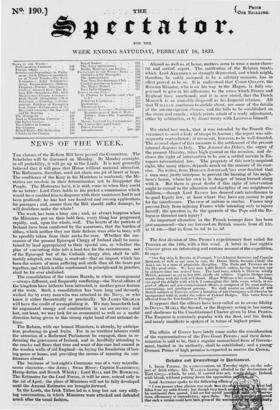NEWS OF T H E WEEK.
THE clauses of the Reform Bill have passed the Committee. The Schedules will be discussed on Monday. By Monday sennight, in all probability, it will go up to the Lords. It is now generally believed that it will pass that House without material alteration. The Reformers, therefore, need not abate one jot of heart or hope. The confidence of the King in his Ministers is unabated; the Mi- nisters are resolute in their determination not to disappoint the People. The Moderates have, it is said, come in when they could do no better: Lord GREY holds in his pocket a commission which would have enabled him to dispense with their assistance had it not been proffered; he has had one hundred and seventy applications for peerages ; and, sooner than the Bill should suffer damage, he will doubtless make the whole ! - . The week has been a busy one ; and, as always happens when the Ministers put on their bold face, every thing has progressed rapidly, and, upon the whole, well. The hearts of the patriots of' Ireland have been comforted by the assurance, that the burden of tithes, which neither they nor their fathers were able to bear, will be speedily taken from their necks for ever. Whether the suc- cessors of the present Episcopal Clergy of Ireland shall be main- tained by land appropriated to their special use, or whether the plan of converting tithe into a land-tax for the maintenance, not of the Episcopal but of the Catholic clergy also, shall be ulti- mately adopted, one thing is resolved—that an impost, which has been the source of more suffering and strife than all the taxes put together, and which is alike condemned in principle and in practice, shall be for ever abolished.
The consolidation of the various Boards, to whose management —always different, and frequently conflicting—the Naval affairs of the kingdom have hitherto been intrusted, is another great feature of the week. Such a consolidation has been long and devoutly wished for by every man who was attached to the Navy; or who knew it either theoretically or practically. Sir JAMES GRAHAM will have the credit of accomplishing it. We may henceforth look for augmented energy and combination in our sea service ; and last, not least, we may look for an economical as well as a useful direction being given to this strong right hand of our national de- fence.
The Reform, with our honest Ministers, is already, by anticipa- tion, producing its good fruits. For in no worthier labours could the attention of a Reformed Parliament be engaged, than in re- dressing the grievances of Ireland, and in heedfully attending to the cracks and flaws that time and want of due care had caused in the wooden walls of old England—in laying the foundation of last- ing peace at home, and providing the means of insuring its con- tinuance abroad.
The business of last night's Commons was of a very miscella- neous character,—the Army; Swan River; Captain SARTORIUS; Hemp-duties and Scotch Whisky; Lord HILL and Dr. BOWRING.. The Estimates for the Land Forces, it will be seen, extend only to the 1st ofApril ; the plans of Ministers will not be fully developed until the Annual Estimates are brought forward. In the Lords, the Irish, Tithes led to a long but not very edify- ing conversation, in which Ministers were attacked and defended lunch. after the Usual fashien. Abroad as well as at home, matters seem to wear a more cheer- ful and settled aspect. The ratification of the Belgian treaty, which Lord ABERDEEN so strongly deprecated, and which might, therefore, be safely assumed to be a salutary measure, has in effect proved to be so. It is understood that Count ORLOFF, the Russian Minister, who is on his way to the Hague, is fully em- powered to give in his adherence to the cause which France and England have sanctioned; and it is now stated, that the Dutch Monarch is as am- icably disposed as his Imperial relation. All that WILLIAM continues to stickle about, are some of the details of the internavigation clauses, and the tolls to be established on the rivers and canals ;. which points admit of a ready adjustment, either by arbitration, or by direct treaty with LEOPOLD himself.


























